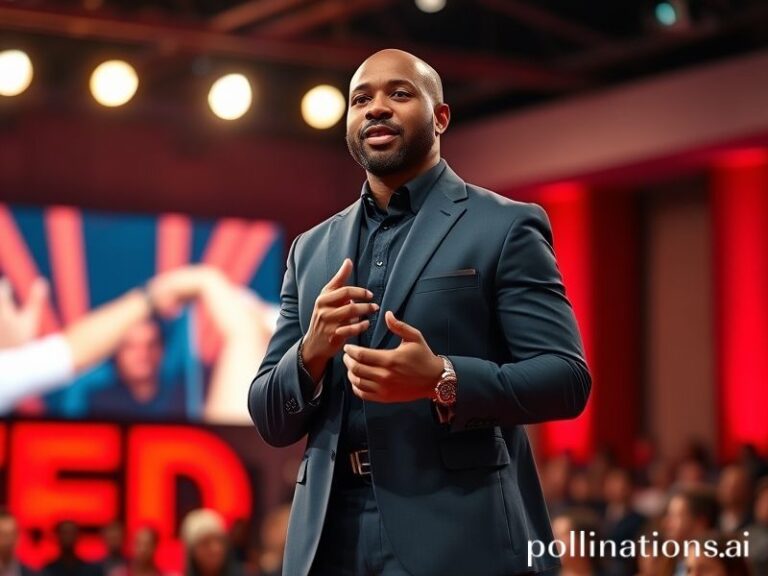Joel Dommett: The Sequined Savior of Global Distraction
Joel Dommett and the Glorious Banality of Global Fame
By our man in the departure lounge, nursing lukewarm prosecco and existential dread
KUALA LUMPUR—Somewhere above the Andaman Sea, a satellite beams The Masked Singer UK to seat-back screens on an AirAsia red-eye. In 27C, a Malaysian hedge-fund manager toggles between Joel Dommett’s grin and a Bloomberg terminal blinking red over Evergrande. The juxtaposition is perfect: one screen shows the slow-motion implosion of a property empire; the other shows a man in a sequined fox costume pretending not to know who Sausage is. Both, in their own way, are elaborate fictions we agree to finance.
Dommett—six-foot-two, cheekbones sharp enough to slice naan—has become an unlikely unit of cultural exchange. To Brits he’s the affable host who can say “Take it off!” without sounding like a #MeToo headline. To Brazilian Netflix subscribers he’s that guy from Reality Z who got chased by zombies in a shopping mall (a plot that now feels like a documentary about Black Friday). In Seoul, local execs studied his presenting style before launching their own masked franchise, proving that South Korea can export K-pop, kimchi, and now the intellectual property of a Gloucestershire lad who once ate kangaroo anus on I’m a Celebrity.
This is globalization’s latest parlor trick: take a minor deity from the English reality-TV pantheon, sprinkle him across 190 territories, and watch him mutate into a low-calorie universal solvent. Dommett’s career is essentially a case study in how the attention economy re-packages provincial charm as a trans-continental commodity—like oat milk, but with better teeth.
The algorithmic alchemy works because Joel embodies the safest kind of modern masculinity: non-threatening enough for pre-watershed, gym-honed enough for thirst-trap Instagram grids. He is, in short, the human equivalent of an oat flat-white: blandly palatable from Lagos to Luton. One can imagine a dystopian future where U.N. peacekeepers drop crates of Dommett-hosted clip shows instead of food rations. Starving refugees would still complain, naturally, but at least they’d recognize the face.
Meanwhile, the global implications tick along like a Swiss watch made in Shenzhen. Every time a viewer in Helsinki streams Joel’s stand-up special, a micro-payment shuttles through Amsterdam servers, pings a rights house in Los Angeles, and eventually lands in a London accountant’s Excel sheet labeled “Dommett, J – Q3 residuals.” Multiply by 3.2 million streams, factor in currency hedging against the post-Brexit pound, and you begin to understand why the IMF cites “entertainment services” as a stealth stabilizer in current-account deficits. Somewhere, Christine Lagarde is raising an eyebrow and pretending she’s never heard of the Hedgehog costume.
Of course, the dark joke is that none of this requires Joel to be particularly funny. Wit is optional; distribution is destiny. In the same week Dommett guest-hosted The One Show, global military spending hit $2.2 trillion. Both statistics are true, both feel absurd, and both scroll past us on the same phone screen while we wait in line for Pret. The human brain, evolved to track wildebeest migrations, now juggles thermonuclear anxiety and a quiz about celebrity seahorses. Evolution didn’t prepare us for this buffet of incongruities, but capitalism did.
Still, give the man credit: he’s weaponized Gen-Z self-deprecation into soft power. When Joel live-tweets Eurovision with tongue firmly in surgically enhanced cheek, he’s doing informal diplomacy for a post-imperial island that still can’t decide if it’s European. His Twitter bio reads “Professional Shirt Wearer.” Somewhere in Brussels, a Eurocrat sighs into a glass of Orval, recognizing that this is exactly the kind of ironic humility the British used to export via gunboats.
Will Dommett matter in fifty years? Probably not. But his pixelated grin is already archived in server farms cooled by Nordic hydro-power—digital mummification for a civilization that refuses to confront its own expiry date. Future archaeologists will unearth a cache of Masked Singer episodes and conclude we worshipped sequined oracles who spoke in Auto-Tune. They won’t be entirely wrong.
As the AirAsia flight begins its descent, the hedge-fund manager closes both screens, having neither solved Evergrande nor guessed Blob’s identity. Outside the window, dawn creeps over palm-oil plantations that finance yet another season of reality shows. Somewhere below, a new Joel is waiting to be minted—ready to smile, to banter, to distract us from the slow collapse we collectively financed on subscription.







